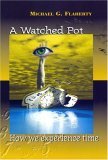review of ‘A Watched Pot: How We Experience Time’ (Book A Month Challenge)
Written on January 19, 2008
 A book about time for the January Book A Month Challenge:
A book about time for the January Book A Month Challenge:
A Watched Pot: How We Experience Time by Michael G. Flaherty (New York University Press, 1999)
Flaherty explores variations in the perceived passage of time from a social psychological perspective, seeking to account for three paradoxical aspects and three elementary forms of time experience. The paradoxes are (1) that time seems to pass slowly in periods that are either unusually busy or unusually empty of activity; (2) the same period can be experienced as a long time while it is happening, but a short time when it is recollected, (3) some busy periods seem to pass slowly while others seem to pass quickly. The three elementary forms of variation in time perception are protracted duration, temporal compression, and synchronicity (experience synchronized with clock time).
Protracted duration is experienced in situations involving suffering or other intense emotions, violence or danger, waiting and boredom, altered states, concentration and meditation, or shock and novelty.
Flaherty arrives at the concept of “intensity of conscious information processing” to account for the variations in experience of time, so that protracted duration is associated with high density of conscious information processing; synchronicity is experienced when the density of conscious information processing is moderate; and temporal compression is correlated with low density of conscious information processing. (p. 113)
The author started out collecting examples of protracted duration, then developed a theory to account for the variations, which he then applied to cases of temporal compression. In the conclusion, cross-cultural issues are considered, as well as the possibility of deliberate “time work” — manipulation of temporal experience as a form of creativity or self-actualization.
The book was fairly interesting but did not give me much in the way of new ideas or concepts to apply to my experience of time, as I was hoping for. Lumping time perception into three broad categories might have obscured some of the more unusual aspects of temporal experience. [Next morning’s thought – Can I change the intensity of my conscious processing to slow down or speed up perceived time?]
Filed in: Book A Month Challenge,psychology.


